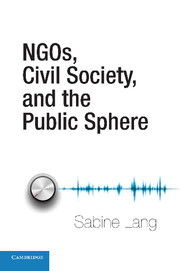Crossref Citations
This Book has been
cited by the following publications. This list is generated based on data provided by Crossref.
Hemment, Julie
2014.
Theorizing NGOs.
p.
119.
Helms, Elissa
2014.
Theorizing NGOs.
p.
21.
Lang, Sabine
2014.
Theorizing NGOs.
p.
266.
Bernal, Victoria
and
Grewal, Inderpal
2014.
Theorizing NGOs.
p.
301.
Costa, LeeRay M.
2014.
Theorizing NGOs.
p.
166.
Karim, Lamia
2014.
Theorizing NGOs.
p.
193.
Woodward, Alison E.
and
van der Vleuten, Anna
2014.
Gender Equality Norms in Regional Governance.
p.
67.
Hodžić, Saida
2014.
Theorizing NGOs.
p.
221.
Alvarez, Sonia E.
2014.
Theorizing NGOs.
p.
285.
Leve, Lauren
2014.
Theorizing NGOs.
p.
50.
Grünberg, Laura
2014.
Theorizing NGOs.
p.
248.
Bernal, Victoria
and
Grewal, Inderpal
2014.
Theorizing NGOs.
p.
1.
Sharma, Aradhana
2014.
Theorizing NGOs.
p.
93.
O’Reilly, Kathleen
2014.
Theorizing NGOs.
p.
143.
2014.
Theorizing NGOs.
p.
311.
Thrandardottir, Erla
2015.
NGO LEGITIMACY: FOUR MODELS.
Representation,
Vol. 51,
Issue. 1,
p.
107.
Gallo-Cruz, Selina
2016.
Weaving political fields: non-violent INGOs and the global grass roots.
European Journal of Cultural and Political Sociology,
Vol. 3,
Issue. 2-3,
p.
243.
Kutay, Acar
2016.
A Critical Transnational Public Sphere: Bringing Back Common Good and Social Ontology in Context.
Globalizations,
Vol. 13,
Issue. 1,
p.
47.
van Wessel, Margit
2017.
Europeanised or European? Representation by civil society organizations in EU policy making, by Sandra Kröger.
Critical Policy Studies,
Vol. 11,
Issue. 1,
p.
117.
Schneiker, Andrea
2017.
NGOs as Norm Takers: Insider–Outsider Networks as Translators of Norms.
International Studies Review,
p.
viw041.





